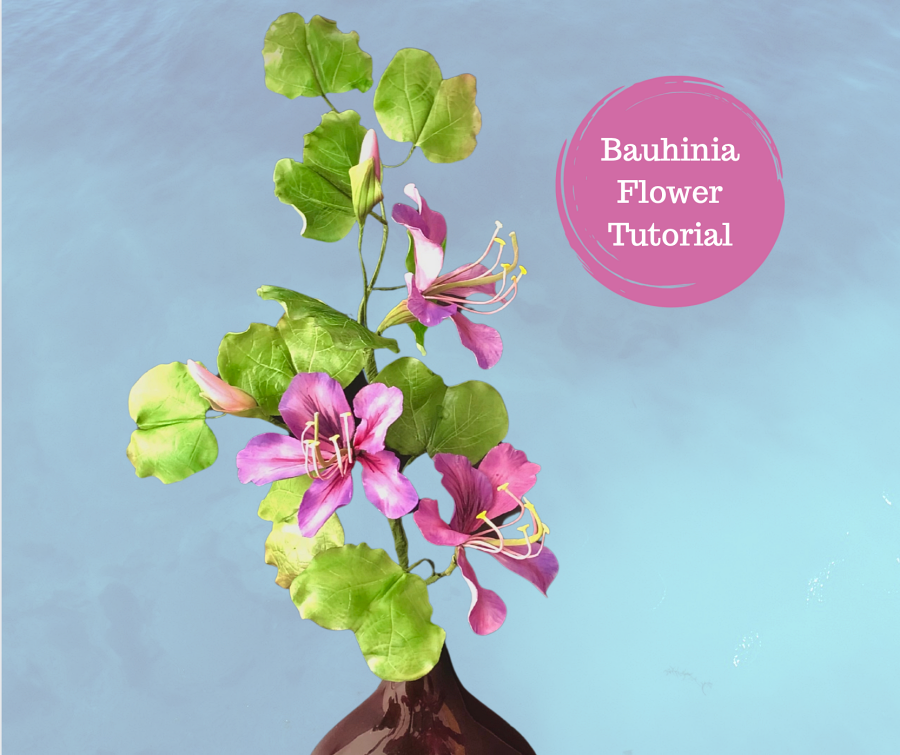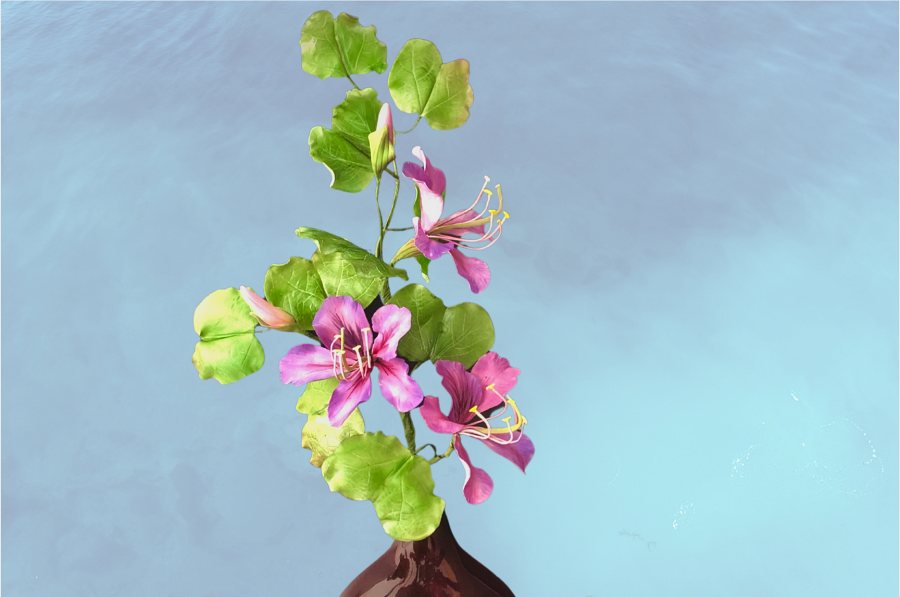
Author: Zlatina Lewis
FB: ZL CAKE BOUTIQUE
Skill level: BEGINNERS
FROM ZLATINA
Note: There are many different varieties of Bauhinia and the plant can vary in shape, size, colour and form.
I’ve made the flower as near to nature as possible, although it is not 100% botanically accurate.
You will need:
- Saracino Pasta Bouquet (coloured in pale green & pink colour)
- Florist wires white (20,24,26,28 gauge)
- Florist tape – mid-green
- Edible colour gel (green & pink)
- Edible colour dusts (yellow, pink, plum, violet, white, burgundy, Light green, deep green, dark green)
- Edible glue
- Edible glaze
- Alcohol or lemon extract for mixing with dust colour
- Mimosa or yellow coloured semolina
- Cornflour for dusting
- Balling tool
- Dresden tool
- Veining tool
- Cutting wheel
- Scalpel
- Non-stick rolling pin
- Grooved Board
- Foam Pad
- Bauhinia cutter (Tinkertech Two)
- Amaryllis or Lily veiner
- Bauhinia leaf veiner (Aldaval)
- Paint brushes (Flat for dusting, thin brush for making the markings )
- Wire cutter
- Scissors
- Drying shapers or sponge

Step 1
Making the Pistil – you will need 1/3 length of 26 gauge wire and a small pea size of pale green Pasta Bouquet.

Step 2
Hold the paste between your fingers and work it down the wire to cover half of its length (between 5-6cm).

Step 3
Flatten the sides gently and bend to form an ‘S’ shape curve.

Step 4
Slightly flatten the tip of the pistil and leave it to dry.

Step 5
Dust the pistil with light green powder colour.

Step 6
To make the stamens, you will need 1/3 length of 28 gauge wire and a small ball of white Pasta Bouquet.

Step 7
Wrap the paste around the wire leaving the very end exposed. For the ‘T’ anther bend the end of the wire and attach a tiny sausage shape piece of white paste.

Step 8
Moisten the end with edible glue and dip into mimosa or yellow coloured semolina to look like the pollen.

Step 9
Make 5 stamens. Bend the stamens gently into an S shape to create a curve.

Step 10
Dust the stamens with a pale mix of violet and white colour.

Step 11
Tape the pistil and stamens together with ¼ width of Nile green florist tape. Position the pistil slightly above the stamens to resemble the form of open palm.

Step 12
To make the petals – Colour a small amount of Pasta Bouquet with pink gel colour to achieve a pale pink. Roll out some of the paste using a thin none stick rolling pin and a grooved board.

Step 13
For the Bauhinia you need five petals – Cut out one petal using the main middle cutter (the widest of the set). Cut out two petals of each of the other cutter shapes (left and right for each petal shape).

Step 14
Insert a ¼ length of 26 gauge florist wire into the grove of the petal inserting at least half way.

Step 15
Pinch the narrow end and roll gently between your fingers to make sure that the paste is securely connected to the florist wire.

Step 16
Vein the petals using the Lily/Amaryllis veiner.

Step 17
Place the petals on the foam pad and thin the edges using a ball tool.

Step 18
Frill the edges of the Bauhinia petals with the veining tool.

Step 19
Gently pinch the back of the petals to create a central vein, shape them and leave them to dry 20-30 minutes.

Step 20
Using your flat headed brush dust each petal, working from the edges towards the base of the petal with a mix of pink, violet and white dust colours.

Step 21
At the base of the petals dust with plum colour to accentuate it and give it depth.

Step 22
Mix a few drops of clear alcohol or lemon extract with violet/plum dust colour. Using a thin brush paint lines resembling a fan formation on the central petal and leave a few minutes to dry.

Step 23
Assemble the petals around the pistil and stamens using ½ width Nile green florist tape.

Step 24
Start with the middle (central) petal, attach the left and right petals of the top (frilly) set slightly behind the middle petal.

Step 25
To the base of the flower attach the left and right petals of the bottom set cutter.

Step 26
Gently form your petals to the position you want them to take whilst they are workable and not dry.

Step 27
To make a bud – You need a small ball of pale pink paste and ½ length 20 gauge wire. Make a small hook at the end of the wire.

Step 28
Roll the paste into a cone shape and insert the wires turning the paste gently. When we twist the paste the hook will attach itself well.

Step 29
Pinch the end of the cone shape to attach it well to the wire.

Step 30
Make three grooves along the length of the bud to line with the outer petals. Dust the bud gently with a mix of pink and violet dust colours.

Step 31
To make the bract – Roll out pale green coloured Pasta Bouquet and cut out a leaf shape using a cutting wheel, scalpel or with the central Bauhinia cutter.

Step 32
Mark veins using a Dresden tool and attach the bract at the base of the flower.

Step 33
Dust colour it with a mix of light and deep green dust colours.

Step 34
Attach the bract around the bud and dust it with the mix of green colours.

Step 35
Wrap the wire of the bud with ½ width Nile green florist tape

Step 36
To make the leaves – Roll pale green coloured Pasta Bouquet using a none stick rolling pin and a grooved board.

Step 37
Using the shape of the Bauhinia leaf veiner cut a leaf shape using a cutting wheel or a scalpel.

Step 38
Insert ¼ length 24 gauge florist wire into the grove of the petal to at least half way.

Step 39
Pinch the end to ensure that the paste is securely connected to the florist wire.

Step 40
Vein the leaf using the Bauhinia leaf veiner.

Step 41
Place each leaf on the foam pad and thin the edges using a ball tool.

Step 42
Make 4-5 leaves. Form them to add shape and leave them to dry on a drying shaper or sponge.

Step 43
Dust each leaf with a deep green dust colour and over-dust the edges with dark green dust colour.

Step 44
Glaze the leaves with edible spray glaze and leave to dry.

Step 45
Wrap the wire of the leaves with ½ width Nile green florist tape.

Step 46
Assemble the leaves into a small branch using ½ width Nile green tape and a 20 gauge florist wire.

Step 47
Attach a few leaf branches and blossoms together to make a beautiful arrangement.


